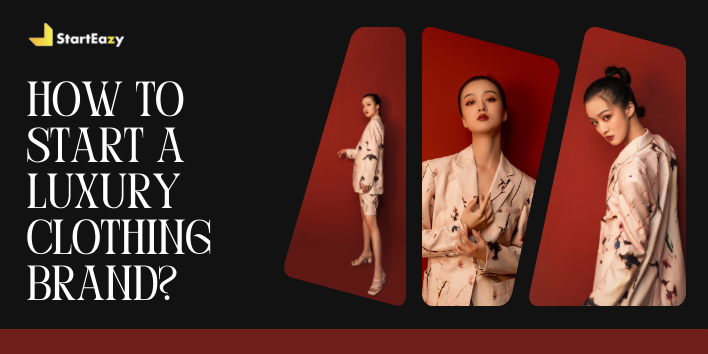How to Start a Luxury Clothing Brand | The Art of Fashion

Starting a luxury clothing brand is a journey that blends artistry with business acumen. The allure of high-end fashion attracts creative minds eager to express their vision through quality craftsmanship and exclusive designs. But beyond the beauty of luxury fashion, building a brand from scratch requires meticulous planning, strategic positioning, and business expertise.
This guide will take you through every essential step on how to start a luxury clothing brand and navigate the ever-evolving world of fashion.

1. Define Your Brand Identity
The cornerstone of any luxury clothing brand is its unique identity. What will set your brand apart from others in a highly competitive market?
Luxury is all about exclusivity, craftsmanship, and storytelling.
You need to have a clear vision of who you are, what you stand for, and how you want to be perceived by your target audience.
Key Questions to Ask:
-
What is the essence of your brand?
-
Who is your target audience?
-
What kind of lifestyle does your brand promote?
Your luxury brand must evoke emotions, inspire confidence, and make customers feel special.
To achieve this, your branding—from the logo to packaging and marketing materials—must exude sophistication and luxury.
Pro Tip: Research successful luxury brands like Chanel, Gucci, or Louis Vuitton. Analyze their identity, tone, and positioning to understand how they connect with their audience.
2. Conduct Market Research
Launching a luxury clothing brand requires a deep understanding of your market. Analyze your competitors, understand the latest fashion trends, and identify gaps in the market.
Luxury customers have unique expectations, and understanding them is essential to tailor your brand to meet their desires.
Follow these steps to conduct an effective market research:
-
Competitor Analysis: Identify direct and indirect competitors. Understand their product offerings, pricing strategies, and marketing tactics.
-
Customer Profiling: Study the demographics, lifestyle choices, and preferences of luxury customers.
-
Trend Monitoring: Stay updated with global fashion trends, but also develop a keen sense of timeless designs that appeal to your target audience.
By investing time in understanding the market, you can create a brand that not only stands out but also resonates deeply with your target demographic.
3. Create a Unique Product Line
In the luxury clothing industry, your products must reflect high-quality craftsmanship, innovation, and exclusivity.
Every design detail should be meticulously crafted to meet the highest standards, as luxury customers are willing to pay a premium for exceptional quality.
-
Materials: Source only the finest fabrics and materials. This could mean working with rare textiles, hand-sewn embellishments, or custom fabrics.
-
Design: Your designs should embody sophistication and creativity. Work with experienced fashion designers who share your vision.
-
Production: Whether you're outsourcing production or setting up your in-house atelier, ensure that your manufacturing process aligns with the luxury status of your brand.
The exclusivity of your product line is crucial. Limited editions, bespoke tailoring, and personalized services can elevate your brand’s image in the eyes of customers.
4. Build a Strong Brand Aesthetic
In the fashion industry, visual appeal is everything. Your brand's aesthetic encompasses more than just your clothing designs—it extends to your packaging, website, store layout, social media and marketing collateral.
-
Visual Consistency: Ensure that your visual elements, including colors, fonts, and photography style, are consistent across all platforms.
-
Packaging: Luxury packaging should feel premium. High-quality materials, custom packaging, and elegant design contribute to the customer’s overall experience.
-
Website Design: Your website is the online representation of your brand. It should be sleek, user-friendly, and designed to reflect the luxury experience.
Work with skilled graphic designers, web developers, and marketing professionals to craft a cohesive brand aesthetic that appeals to the discerning luxury market.
5. Register Your Business and Handle Legalities
Before launching your luxury clothing brand, you must register your business and ensure that all legal aspects are covered.
Business registration gives you credibility, protects your brand name, and ensures that you're compliant with local laws and regulations.
Types of Business Registrations to Consider
-
Sole Proprietorship: This is a straightforward option if you're starting your brand independently. However, it offers no personal liability protection, meaning your personal assets could be at risk if the business incurs debt.
-
Private Limited Company: A popular choice for fashion startups, a private limited company registration online provides limited liability protection. This means that your personal assets are separate from your business liabilities. Additionally, it allows you to raise funds by selling shares, making it easier to attract investors.
-
Limited Liability Partnership (LLP): This structure is ideal if you have a business partner. An LLP provides personal liability protection while maintaining a flexible partnership arrangement. It combines the benefits of a partnership and a corporation, allowing for a more structured management approach.
-
Partnership: If you want to collaborate with one or more individuals, a partnership can be a suitable option. This structure allows for shared decision-making and responsibilities but doesn't provide personal liability protection like an LLP or a private limited company.
-
One Person Company (OPC): This is a relatively new concept in business registration. An OPC allows a single individual to operate a company with limited liability protection. It's an excellent option for solo entrepreneurs looking to establish a formal business structure without partners.
GST Registration
If you plan to sell your products in India, you’ll need to register for Goods and Services Tax (GST).
This is mandatory for businesses with an annual turnover exceeding ₹40 lakh (₹20 lakh for northeastern states). GST registration enables you to collect taxes from customers and claim input tax credits on purchases made for the business.
Documents Required for Business Registration
-
PAN Card
-
Proof of Address
-
Identity Proof
-
Bank Details
-
Business Name Registration Certificate
-
Incorporation Documents (MOA and AOA)
-
Digital Signature Certificate (DSC)
-
Director Identification Number (DIN)
-
No Objection Certificate (NOC)
If handling business registration feels overwhelming, StartEazy is here to help!
Get in touch with our experts by filling out the form on your right for hassle-free business and GST registration.
Our team will guide you through the process, ensuring you meet all legal requirements to get your brand up and running without any headaches.
6. Establish Your Supply Chain
Luxury brands rely heavily on an efficient and reliable supply chain. From sourcing materials to production and distribution, each part of the process should meet the highest standards of quality control.
Supply Chain Essentials:
-
Sourcing Materials: Establish long-term relationships with fabric suppliers known for their quality. You can also consider sustainable and eco-friendly materials, which are increasingly valued in the luxury market.
-
Manufacturing: Whether you set up your own workshop or outsource to specialized manufacturers, it’s crucial to maintain consistency in craftsmanship and quality.
-
Inventory Management: Luxury brands often work with limited stock to maintain exclusivity. Use efficient inventory management systems to track stock levels and avoid overproduction.
Managing your supply chain effectively ensures that your brand consistently delivers the high quality expected from a luxury label.
7. Develop a Marketing and Sales Strategy
Marketing plays a pivotal role in the success of your luxury clothing brand.
Building brand awareness and connecting with the right audience requires a well-thought-out marketing strategy that conveys the exclusivity and luxury of your products.
Marketing Channels to Focus On
-
Social Media: Instagram, Pinterest, and TikTok are powerful platforms for fashion brands. Use them to showcase your designs, behind-the-scenes content, and collaborations with influencers.
-
Influencer Collaborations: Collaborate with high-profile fashion influencers and bloggers to reach your target audience. Authentic collaborations can elevate your brand image.
-
Fashion Shows: Consider hosting or participating in luxury fashion shows to build credibility and showcase your brand’s latest collection.
-
Content Marketing: Share your brand’s story through blogs, videos, and editorial content. High-quality content marketing helps position you as a thought leader in the luxury fashion space.
Luxury marketing is all about storytelling, exclusivity, and creating desire. Every piece of communication should reflect the high standards and values of your brand.
8. Set Pricing and Positioning
Pricing is one of the most crucial factors in luxury branding. Unlike fast fashion, where affordability is the focus, luxury brands command higher prices due to the craftsmanship, exclusivity, and superior quality associated with the products.
-
Value Perception: Your pricing should reflect the quality, exclusivity, and craftsmanship of your products.
-
Premium Positioning: Ensure that every aspect of your brand—product quality, customer experience, marketing, and packaging—justifies the premium price point.
-
Competitor Benchmarking: Research competitors’ pricing strategies to determine how your brand will be positioned in the market.
Remember, luxury customers are willing to pay for exclusivity and top-notch quality. Don’t undersell your brand by lowering prices—maintain the premium feel of your products.
9. Launch Your Brand
Once you’ve set up your business, crafted your product line, and developed a marketing strategy, it’s time to officially launch your luxury clothing brand. Launching a luxury brand requires careful planning and execution to create buzz and excitement.
-
Create a Pre-Launch Campaign: Build anticipation before the official launch through teasers, sneak peeks, and exclusive content.
-
Host an Exclusive Event: Consider launching your brand with an invite-only fashion show or private event for influencers, fashion editors, and key industry players.
-
Leverage PR and Media: Work with fashion magazines and luxury blogs to generate press coverage for your launch.
The initial impression you make on your audience can have a lasting impact, so ensure that your launch event reflects the luxury status of your brand.
10. Deliver Exceptional Customer Service
Luxury brands thrive on providing an extraordinary customer experience. From personalized shopping experiences to impeccable customer service, every interaction should reinforce your brand’s exclusivity and high standards.
-
Bespoke Services: Offer personalized recommendations, custom fittings, and exclusive one-on-one consultations.
-
Post-Sale Support: Ensure that your customers receive follow-up support, whether it’s care instructions for their garments or assistance with returns.
-
Loyalty Programs: Create a loyalty program that rewards repeat customers with exclusive perks, such as early access to new collections or private shopping experiences.
Exceptional customer service is a hallmark of a successful luxury brand and can turn first-time buyers into lifelong loyal customers.
Starting a luxury clothing brand is both an art and a science.
It requires passion, creativity, and a strong understanding of business fundamentals.
By following these steps, you can build a brand that resonates with luxury consumers, stands the test of time, and creates a lasting impact in the world of fashion.
If you need assistance with business registration, GST compliance, or any other legal aspects, StartEazy is here to help! Fill out the form on your right to connect with our experts and start your luxury brand journey with ease.








